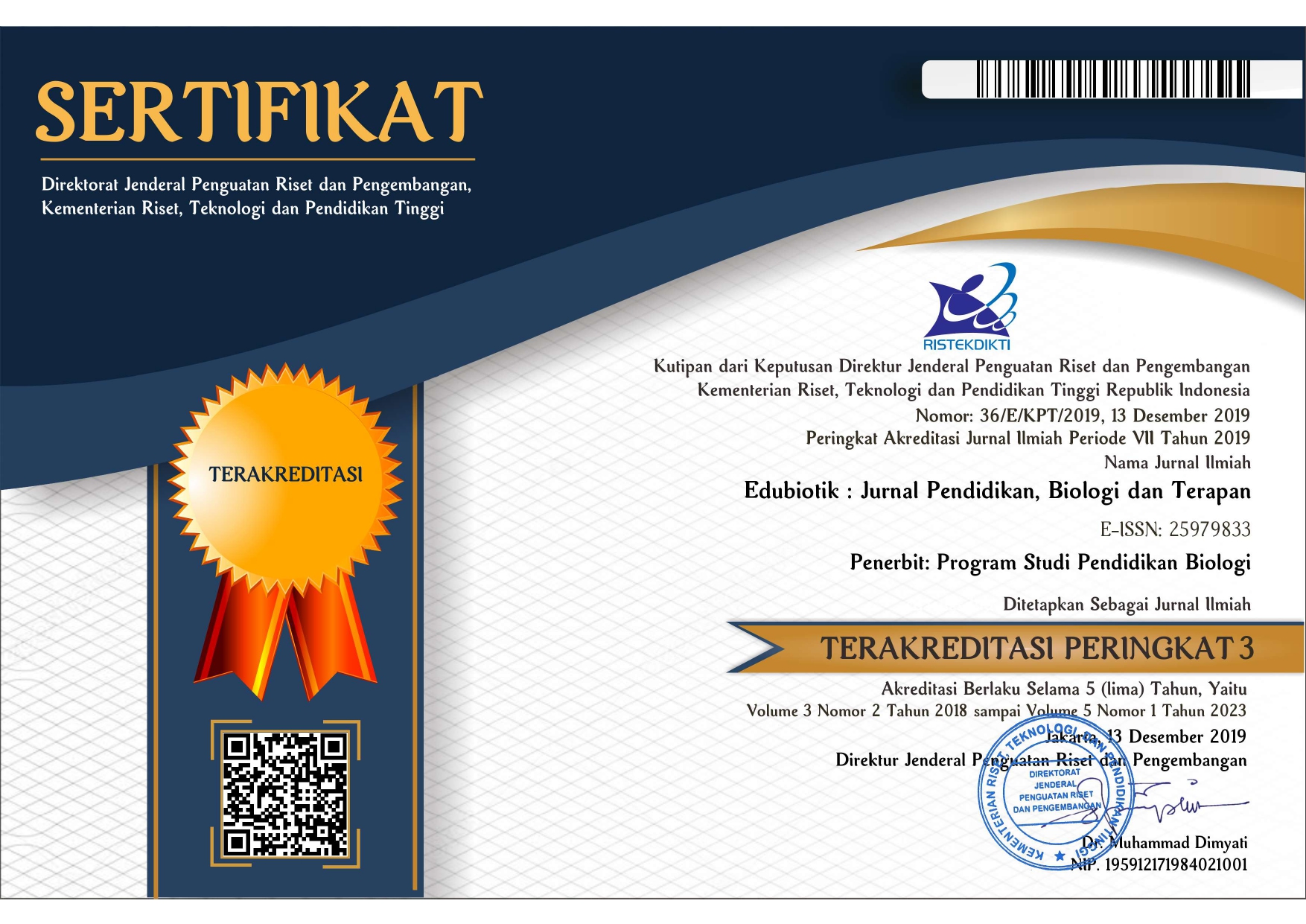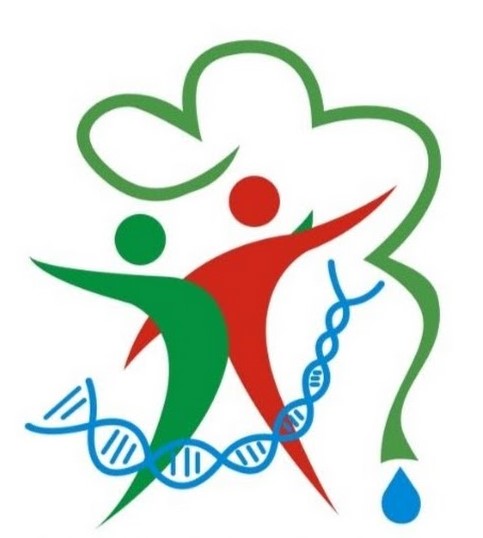The characteristics teaching materials of biology laboratory management
Abstract
The suitable teaching materials will make it easier for students to learn in the classroom. To present suitable teaching materials, a needs analysis is needed. This study aimed to determine the types and characteristics of teaching materials needed in learning biology laboratory management. The survey method was carried out to students who were randomly selected. The instrument is arranged in the form of a questionnaire by paying attention to each characteristic indicator of various teaching materials. The validity of the instrument used a combination of expert judgment. The questionnaire is distributed via google form to students who have taken laboratory management courses with a filling period of 2 weeks obtained 123 respondents. The data were analyzed descriptively of quantitatively and qualitatively. The results showed that the percentage of students who needed teaching materials for biology laboratory management lectures was 98%; the characteristics of teaching materials wanted by students included: containing learning objectives, using simple language, sequenced materials according to lecture sessions, containing summaries, and providing feedback. Teaching materials based on existing characteristics can be in the form of modules that are adapted to the Semester Learning Plan.
References
Arsanti, M. (2018). The development of teaching materials for creative writing courses containing religious character education values for students of Indonesian Language and Literature Education, Faculty of Teacher Training and Education, UNISSULA. KREDO : Scientific Journal of Language and Literature, 1(2), 71-90. https://doi.org/https://doi.org/10.24176/kredo.v1i2.2107
Astuti, R. (2020). Smart, careful and safe laboratory management. CV Jejak.
Ayu, E. D. (2020). The analysis of the difficulties of students of the biology education program of Faculty of Teacher Training and Education UMS in writing essay during the covid-19 pandemic in the academic year of 2019/2020 [Essay, Universitas Muhammadiyah Surakarta]. Surakarta. http://eprints.ums.ac.id/84998/
Bahtiar, B., & Dukomalamo, N. (2019). Basic science process skills of biology laboratory practice: improving through discovery learning. Biosfer: Journal of Biology Education, 12(1), 83-93. https://doi.org/10.21009/biosferjpb.v12n1.83-93
Balqis, T., Hamidah, A., & Aina, M. (2018). The analysis of the biology laboratory management at senior high school in Batanghari Regency, Jambi Province. Edu-Sains: Journal of Mathematics and Natural Sciences Education, 7(1), 16-22. https://doi.org/10.22437/jmpmipa.v7i1.7278
Bradley, R. H., & Putnick, D. L. (2012). Housing quality and access to material and learning resources within the home environment in developing countries. Child Dev, 83(1), 76-91. https://doi.org/10.1111/j.1467-8624.2011.01674.x
Brown, M., Hughes, H., Keppell, M., Hard, N., & Smith, L. (2015). Stories from students in their first semester of distance learning. The International Review of Research in Open and Distributed Learning, 16(4). https://doi.org/10.19173/irrodl.v16i4.1647
Burge, A. (2019). How to design effective teaching modules. UACES: University Association for Contemporary European Studies. https://www.uaces.org/resources/articles/how-design-effective-teaching-modules
Burgess, A., van Diggele, C., Roberts, C., & Mellis, C. (2020). Tips for teaching procedural skills. BMC Med Educ, 20(Suppl 2), 458. https://doi.org/10.1186/s12909-020-02284-1
Chusni, M. M., & Hasanah, A. (2018). The influence of laboratory management skills and scientific literacy on the readiness of prospective physics teachers. Scientific Journal of Physics Education, 6(3), 325-335. https://doi.org/10.20527/bipf.v6i3.5222
El Mhouti, A., Nasseh, A., & Erradi, M. (2013). How to evaluate the quality of digital learning resources? International Journal of Computer Science Research and Application, 3(3), 27-36. https://www.researchgate.net/
Hartanti, D., Sajidan, S., & Prayitno, B. A. (2019). Development of the discovery learning module on plant structures by utilizing the local potential of umbul tlatar to improve self-regulation and environmental awareness of high school students. Jurnal Bioedukatika, 7(1). https://doi.org/10.26555/bioedukatika.v7i1.12532
Jeenthong, T., Ruenwongsa, P., & Sriwattanarothai, N. (2014). Promoting integrated science process skills through betta-live science laboratory. Procedia - Social and Behavioral Sciences, 116, 3292-3296. https://doi.org/10.1016/j.sbspro.2014.01.750
Kertiasih, N. L. P. (2016). The role of the educational laboratory to support the dental nursing lecture process at the Denpasar Health Polytechnic. Dental Health Journal, 4(2), 59-66. https://ejournal.poltekkes-denpasar.ac.id/index.php/JKG/article/view/510
Mao, Z., Wu, T., Zhang, J., Feng, D., Chen, J., Liu, C., Qi, S., Li, Q., Kang, H., & Zhou, F. (2020). Performance of Chinese medical postgraduate students in literature searching: a two-center survey and analysis. Ann Transl Med, 8(21), 1453. https://doi.org/10.21037/atm-20-6932
Maranan, V. M. (2017). Basic process skills and attitude toward science: Inputs to an enhanced students’ cognitive performance [Thesis, Laguna State Polytechnic University]. San Pablo City. https://files.eric.ed.gov/fulltext/ED579181.pdf
Maryani, I., Lestari, N. W., & Saifuddin, M. F. (2019). Magazine based on guided inquiry-an Innovation to overcome natural science learning difficulties in elementary schools. Pedagogika, 136(4), 51-66. https://doi.org/10.15823/p.2019.136.4
Nurhadi, A. (2018). Laboratory management in an effort to improve the quality of learning. Tarbawi: Jurnal Keilmuan Manajemen Pendidikan, 4(1), 1-12. https://doi.org/10.32678/tarbawi.v4i01.832
Pratiwi, P. H., Hidayah, N., & Martiana, A. (2017). Development of HOTS (Higher Order Thinking Skills)-oriented sociology learning assessment course modules. Jurnal Cakrawala Pendidikan, 36(2), 201-208. https://doi.org/10.21831/cp.v36i2.13123
Pribadi, B. A., & Sjarif, E. (2010). Constructivistic approach and development of teaching materials in distance learning system. Journal of Open And Distance Education, 11(2), 117-128. https://jurnal.ut.ac.id/index.php/jptjj/article/view/461
Rahdiyanta, D. (2016). Module Preparation Technique [Suplementary research]. Universitas Negeri Yogyakarta. http://staff.uny.ac.id/sites/default/files/penelitian/dr-dwi-rahdiyanta-mpd/20-teknik-penyusunan-modul.pdf
Recker, M. M., Dorward, J., & Nelson, L. M. (2004). Discovery and use of online learning resources: Case study findings. Journal of Educational Technology & Society, 7(2), 93-104. https://www.jstor.org/stable/jeductechsoci.7.2.93
Rohmani, M., Amin, M., & Lestari, U. (2017). Analysis of the need for research-based teaching materials in biotechnology in the medical field for undergraduate students of Biology Education, State University of Malang based on the ADDIE development model. Seminar on Postgraduate Science Education, State University of Malang, Malang, Indonesia.
Sartika, R. P. (2018). Implementation of the problem based learning model in improving students' understanding of concepts in laboratory management courses. Edusains, 10(2), 197-205. https://doi.org/10.15408/es.v10i2.7376
Şen, C., & Veklİ, G. S. (2016). The impact of inquiry based instruction on science process skills and self-efficacy perceptions of pre-service science teachers at a university level biology Laboratory. Universal Journal of Educational Research, 4(3), 603-612. https://doi.org/10.13189/ujer.2016.040319
Simatupang, A. C., & Sitompul, A. F. (2018). The analysis of biology laboratory facilities and infrastructure and implementation of biology practicum activities in support of class XI class biology learning. Jurnal Pelita Pendidikan, 6(2), 109-115. https://doi.org/10.24114/jpp.v6i2.10148
Susilo, S., & Amirullah, G. (2018). Management and utilization of school laboratories for Muhammadiyah teachers in East Jakarta. Jurnal SOLMA, 7(1), 127-137. https://doi.org/10.29405/solma.v7i1.2380





.png)
2.png)

1.jpg)


